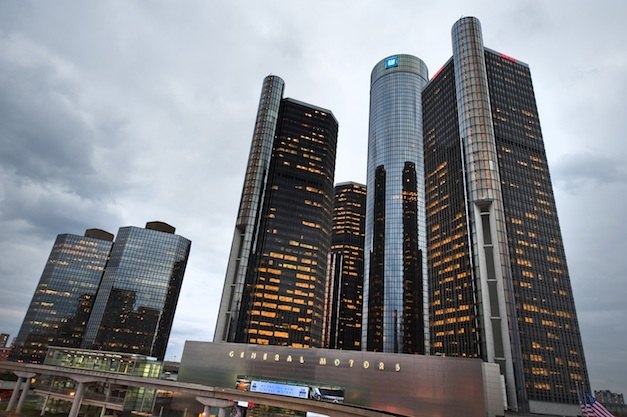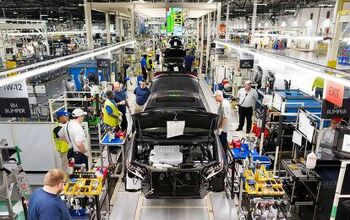President Trump Shares His Thoughts on GM … Again

President Donald Trump weighed in on General Motors again this week. This time, the issue at hand was the fate of Lordstown Assembly — which was shuttered earlier this month as part of the automaker’s ongoing restructuring program.
“Just spoke to Mary Barra, CEO of General Motors about the Lordstown Ohio plant,” Trump tweeted on Sunday. “I am not happy that it is closed when everything else in our Country is BOOMING. I asked her to sell it or do something quickly. She blamed the UAW Union — I don’t care, I just want it open!”
Barra’s take on just how much the United Automobile Workers are to blame is questionable, but the president’s position is not.
While it’s fair to criticize General Motors (and others) for partially dipping out of the United States to pursue interests elsewhere, a lot of the public ire has centered around the timing of its aggressive restructuring program. GM is still making healthy profits and the economy is strong. But that’s a gross oversimplification. We’re not going to go so far as endorse the company’s decisions, but it has a lot of capital tied up in mobility projects and global expansion right now. Even if General Motors wanted to change course immediately, it would have to reassess its entire battle plan.
But there’s more at play than GM’s existing commitments and corporate strategy. Analysts have grown less optimistic about the economy, and there are reasons to believe a global recession is just around the corner. Following a series of closing records in 2018, the stock market endured the ugliest December since the Great Depression. The front-end of the yield curve on U.S. Treasury securities also recently inverted, which typically foreshadows a recession. Meanwhile, unemployment is at a nearly 50-year low. Still, many analysts feel the situation has improved all it’s going to, and fear joblessness may soon start creeping back up.
The cyclical nature of the economy similarly suggests the world is in for some financial shrinkage. Experts have begun to suggest we’re probably past due at this point.
It’s also no surprise that the automaker wanted to shutter Lordstown Assembly. Annual Chevrolet Cruze volume peaked in 2014 at 273,060 units. By 2018, output dropped to 142,617 vehicles. Due to the sudden decline in sales, GM announced that the plant’s 2nd shift would be cut last April. Then, in November, the company said the facility would be “unallocated” in 2019.
However, how much of the external economic aspects GM took into account is debatable and President Trump seems largely unconcerned with the details. If GM isn’t making money for America or capable of furnishing jobs, he claims other automakers would love to.
“General Motors and the UAW are going to start ‘talks’ in September/October. Why wait, start them now! I want jobs to stay in the U.S.A. and want Lordstown (Ohio), in one of the best economies in our history, opened or sold to a company who will open it up fast,” he said in a pair of tweets on Monday morning. “Car companies are all coming back to the U.S. So is everyone else. We now have the best Economy in the World, the envy of all. Get that big, beautiful plant in Ohio open now. Close a plant in China or Mexico, where you invested so heavily pre-Trump, but not in the U.S.A. Bring jobs home!”
While the presiding plan is for GM to keep Lordstown Assembly closed, regardless of the economy, the company is still in for a fight. The UAW has accused the automaker of breaking its existing contract with the union. According to the 2015 agreement, GM is expressly forbidden from closing any of its business units outside of collective bargaining agreements without there being some kind of legitimate disaster (economic or physical) at play. The union, preparing itself for an extended legal battle, just beefed up strike pay for its members.
[Image: General Motors]

A staunch consumer advocate tracking industry trends and regulation. Before joining TTAC, Matt spent a decade working for marketing and research firms based in NYC. Clients included several of the world’s largest automakers, global tire brands, and aftermarket part suppliers. Dissatisfied with the corporate world and resentful of having to wear suits everyday, he pivoted to writing about cars. Since then, that man has become an ardent supporter of the right-to-repair movement, been interviewed on the auto industry by national radio broadcasts, driven more rental cars than anyone ever should, participated in amateur rallying events, and received the requisite minimum training as sanctioned by the SCCA. Handy with a wrench, Matt grew up surrounded by Detroit auto workers and managed to get a pizza delivery job before he was legally eligible. He later found himself driving box trucks through Manhattan, guaranteeing future sympathy for actual truckers. He continues to conduct research pertaining to the automotive sector as an independent contractor and has since moved back to his native Michigan, closer to where the cars are born. A contrarian, Matt claims to prefer understeer — stating that front and all-wheel drive vehicles cater best to his driving style.
More by Matt Posky
Latest Car Reviews
Read moreLatest Product Reviews
Read moreRecent Comments
- Jeff Self driving cars are not ready for prime time.
- Lichtronamo Watch as the non-us based automakers shift more production to Mexico in the future.
- 28-Cars-Later " Electrek recently dug around in Tesla’s online parts catalog and found that the windshield costs a whopping $1,900 to replace.To be fair, that’s around what a Mercedes S-Class or Rivian windshield costs, but the Tesla’s glass is unique because of its shape. It’s also worth noting that most insurance plans have glass replacement options that can make the repair a low- or zero-cost issue. "Now I understand why my insurance is so high despite no claims for years and about 7,500 annual miles between three cars.
- AMcA My theory is that that when the Big 3 gave away the store to the UAW in the last contract, there was a side deal in which the UAW promised to go after the non-organized transplant plants. Even the UAW understands that if the wage differential gets too high it's gonna kill the golden goose.
- MKizzy Why else does range matter? Because in the EV advocate's dream scenario of a post-ICE future, the average multi-car household will find itself with more EVs in their garages and driveways than places to plug them in or the capacity to charge then all at once without significant electrical upgrades. Unless each vehicle has enough range to allow for multiple days without plugging in, fighting over charging access in multi-EV households will be right up there with finances for causes of domestic strife.


































Comments
Join the conversation
Doesn't seem to understand globalization - but neither does his intended audience.
Lies he is done. Most Americans are tired of being the laughing stock of the world and his many crimes are going to catch up to him and besides that we dont do racist presidents in the 20th century!